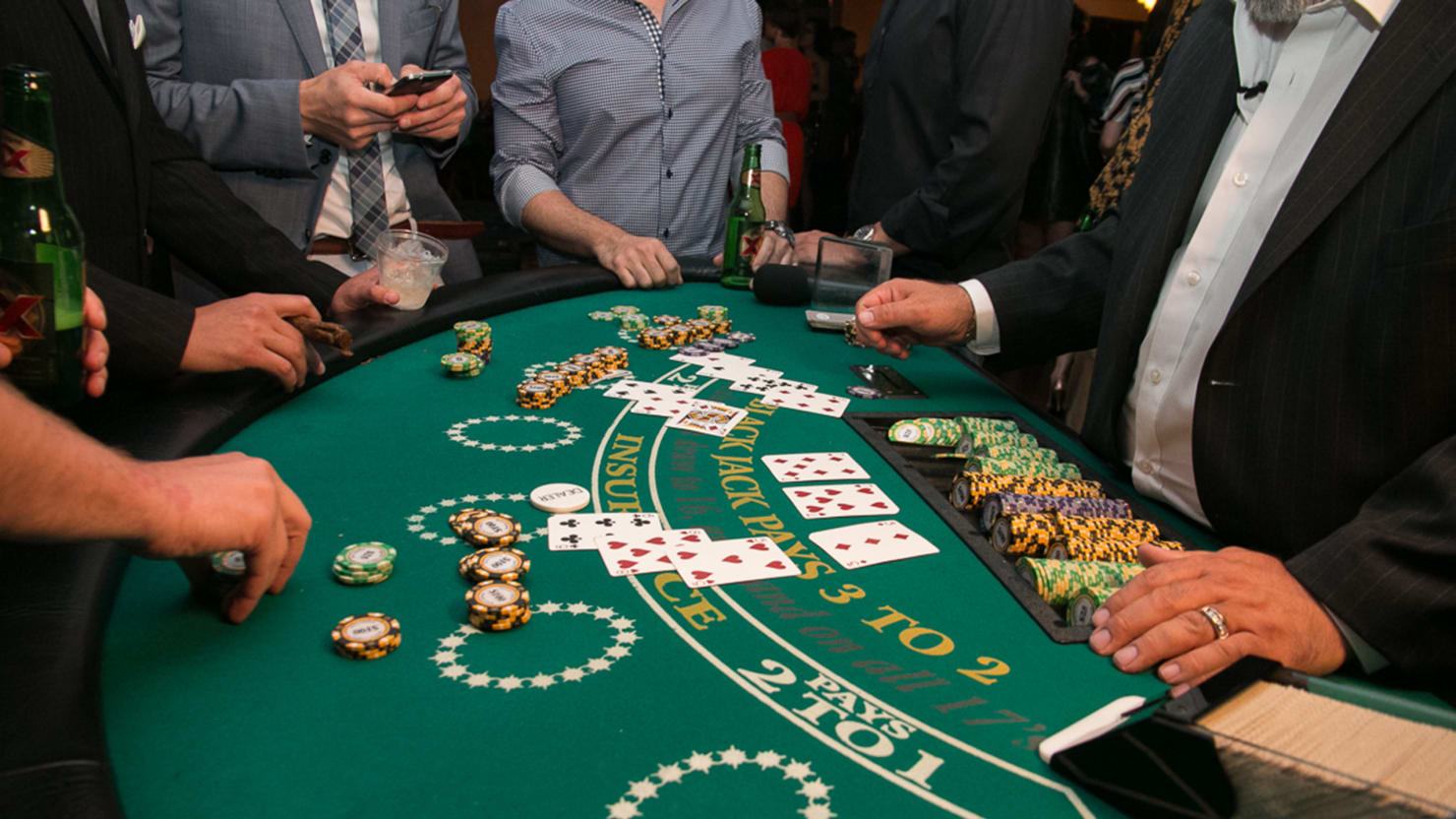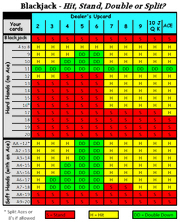When Do Dealers Hit In Blackjack
Posted : admin On 4/13/2022In blackjack, your task is to make a total closer to 21 without going over than the total made by the dealer. To understand the logic behind hitting your hand, we need to understand a few basic blackjack. In blackjack, your task is to make a total closer to 21 without going over than the total made by the dealer. To understand the logic behind hitting your hand, we need to understand a few basic blackjack principles. Blackjack dealers have no options for the in-game decisions of whether to hit or stay; they follow a strict algorithm that will depend on the casino. The dealer waits until the players have exercised all their options, then the dealer reveals his hidden card and hits until he has at least 17 (most common).
- Blackjack Guide Chart
- When Does The Dealer Stop Hitting In Blackjack
- When Do Dealers Hit In Blackjack Games
- When Do Dealers Hit In Blackjack Real Money
By Henry Tamburin
No other hand makes blackjack players feel queasy than the dreaded 16. Players hate to hit the hand because they are afraid tobust. So many chicken out and stand no matter what the dealer shows. Others opt for the surrender option if it’s available figuring losing half a bet is better then losing it all. If your 16comes as a pair of 8’s most players are reluctant to split if the dealer shows a 9, 10, or ace because they are afraid of losing two bets instead of one. Then there is the 16 made up with anAce counted as 11 (i.e., soft 16). So what’s a player to do when he gets a 16?

First, let’s focus on a hard 16. That’s a hand that does not contain an Ace or if it does the Ace counts as one. Some examples of a hard 16 would be 10-6 or 5-7-4 or 7-8-Ace.
The correct basic playing strategy for hard 16 is to stand when the dealer shows a small card (2 through 6) and hit when the dealer shows a high card (7, 8, 9, 10, or Ace). Following thisplaying strategy will not guarantee that you will win every time but that you are more likely to lose less in the long run.. Let me explain.
Suppose you are dealt a 10-6 and the dealer shows a 7 upcard.
If you hit you win on average 30% of the time and lose 70%.
Blackjack Guide Chart
If you stand you will on average win 26% and lose 74%.
Note that you improve your chances of winning the hand by 4% if you hit rather than stand. But the dealer is still an overwhelming favorite to beat you because he will win 70% of the hands toyour 30%. But is it better to win 26% of the time by standing or 30% of the time by hitting? You should hit because it will increase your chance of winning by 4%, not much, but every percentagewill help you in the long run when you play blackjack.
So the bottom line with a hard 16 is this. Even by following the basic strategy, you will lose more hands than you win but in the long run, you will lose less than following a seat-of-the-pantsstrategy. Losing less on hands where you are the underdog is just as important as winning more when you are the favorite.
What if your 16 consists of three or more cards like 5-7-4? Normally the basic strategy ignores the composition of the hand. However, if you have a hard 16 hand consisting of three or morecards, then you should stand when the dealer has a 10 showing. The reason is that you have consumed a few of the small cards that you need if you were to draw. This tips the odds in favor ofstanding.
Some casinos allow players to surrender. This means you give up the opportunity to play out your hand and automatically lose half your bet. Even when surrender is offered, most players don’tlike “giving up” without a fight. So they rarely surrender. That’s unfortunate because surrendering a hard 16 when the dealer shows a 9, 10, or Ace will save you more money in the long run thanhitting. In fact, surrender is always the best option when your chance of winning a hand is less than 25%. Take the hand of hard 16 against a 10. If we hit our chance of winning is 23.4%. Thismeans the dealer’s chance of beating us is 76.6%. If we played a hundred hard 16’s against the dealer 10 with those probabilities, we would end up winning about $23 and losing $77 for a netloss of $54 on average. By surrendering on every hand our net loss would be $50. Get the point? You are better off losing $50 then $54 which is why surrendering a hard 16 against a 10 is thebetter play because you will save $4.

If you happen to be dealt a soft 16 (like Ace-5), you should never surrender and you should never stand. Your first option is to double but only if the dealer shows a weak 4, 5, or 6 upcard. Ifnot, then hit.
When Does The Dealer Stop Hitting In Blackjack
Finally, we have a pair of 8’s. The correct basic strategy play is to always split the 8’s no matter what the dealer shows. Even though you will lose money on both 8’s when you split, thecombined loss, in the long run, will be less than the amount you will lose by playing the one hand as a 16. Splitting 8’s against a dealer 10, by the way, is also a slightly better play thensurrendering.
No question that 16 is a lousy blackjack hand. Unfortunately, it’s one of the most frequent hands you are going to be dealt in blackjack. But, by following the above playing strategy you willbe optimizing your chances of winning more, and losing less, in the long run. It’s the smart way to play blackjack.
Henry Tamburin has been a respected casino gambling writer for the past 50 years. He is the author of the Ultimate Blackjack Strategy Guide and was editor of the BlackjackInsider newsletter. You can read his latest articles on blackjack, video poker, and his personal playing experiences at https://www.888casino.com/blog/writers/henry-tamburin
INSURANCE
If the dealer's upcard is an ACE, he has a 4/13 (31%) chance of getting a Blackjack. You might be allowed to place an extra insurance bet. This is half your stake, and if the dealer does get Blackjack, it pays 2:1 which will effectively return your whole stake on the hand. However, as the dealer's chance of Blackjack is slightly less than 1/3, over time the casino makes a profit of about 2.5% on insurance bets. Therefore insurance is not generally recommended.
WHAT IS CARD COUNTING?
When Do Dealers Hit In Blackjack Games

When Do Dealers Hit In Blackjack Real Money
If you're playing with a single deck and you see the dealer's upcard is an ace, you know your own chance of receiving an ace is reduced. That's simple!However, you will usually be playing a game where up to 8 decks are mixed together. A blank plastic card is inserted near the bottom of the deck. The shuffled cards are then stacked in a 'shoe' from which they are drawn one at a time as required and then discarded. When the blank appears, all the the cards are brought back together, shuffled and then dealing starts from the top again.
Keeping track of what has been played from multiple decks requires a great deal more skill, but it can be worth it. If a lot of low cards have come out (A-9) this means that a higher than usual proportion of 10-value cards are left. This offers a slight advantage to the player, so it's time to raise your bets. By contrast, if a lot of 10 cards have come out, it's better to keep bets low or even stop playing.
Experts have developed several methods of card counting to help you beat the dealer - but be discrete. The dealers don't like it!
If you would like to boost your card counting performance you can always find an abundance of resources online that will increase your odds of success.
Never bet more than you can afford to lose.